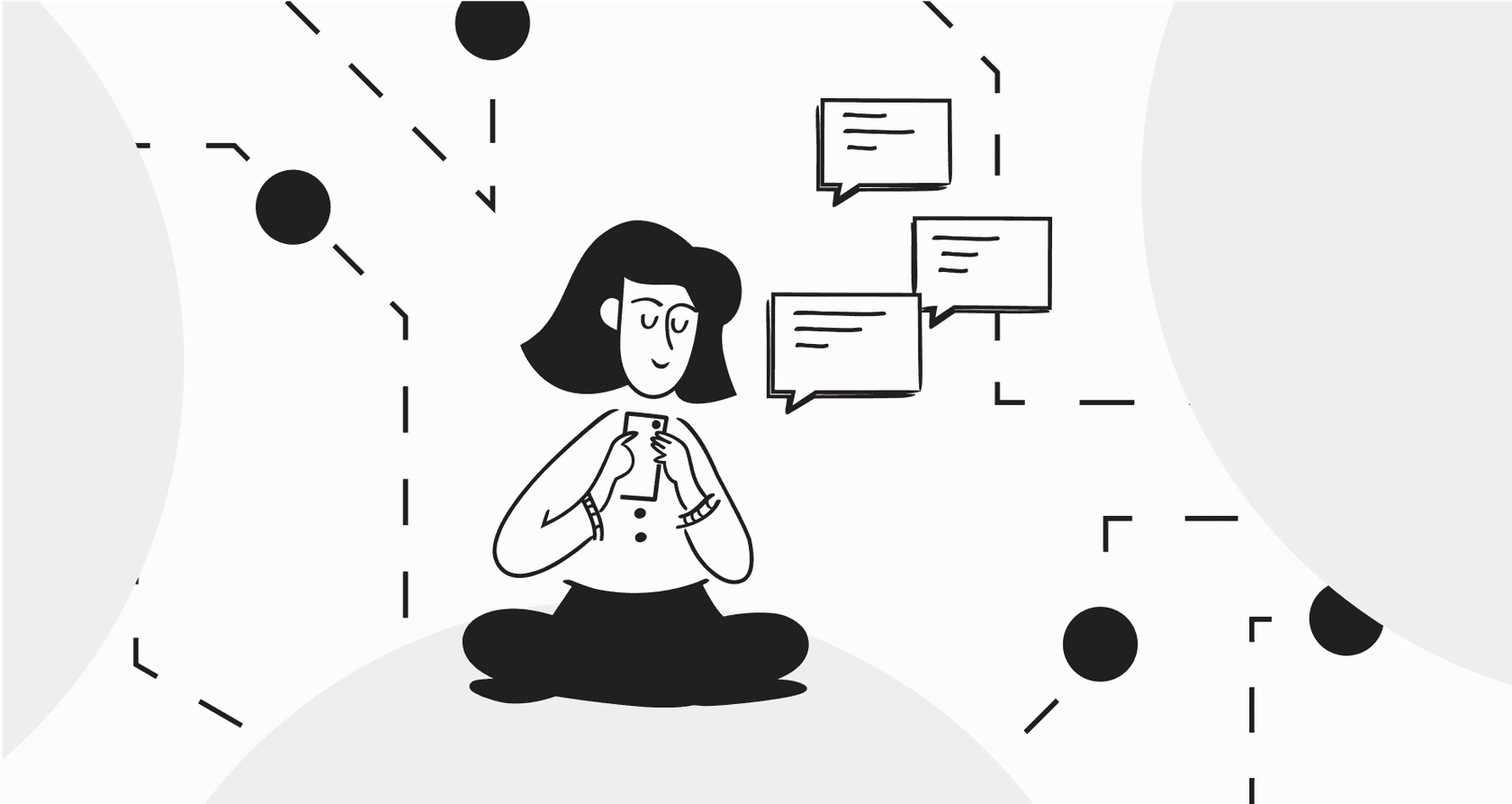
The term "emergent AI" seems to be everywhere lately. You’ll find it in deep-dive Reddit threads, on university research posters, and splashed across the homepages of the latest tech startups. It has a nice ring to it, right? It sounds a bit like science fiction coming to life, hinting at AI systems that are somehow "waking up" and starting to think for themselves.
But what's really going on here? Is this a huge leap toward conscious machines, or just another tech buzzword to add to the pile?
Honestly, it’s a little of both. The concept itself is genuinely fascinating, but it’s often misunderstood and, frankly, misused. This guide is here to clear things up. We’ll break down what emergent AI actually is, untangle the common mix-ups, and talk about what it means for businesses that just want to use AI to get real work done.
What is emergent AI?
At its heart, emergent AI is about complex, unexpected behaviors that show up in an AI system without being directly programmed. It’s what happens when a bunch of simple, independent parts, all following their own simple rules, create a surprisingly smart and sophisticated group behavior.
Think about a flock of birds. Each bird is just following a few basic instincts: don't run into your neighbor, try to keep pace with them, and stay near the group. There’s no leader calling the shots or a master plan for those incredible, flowing patterns they make in the sky. That coordinated, intelligent movement of the whole flock is an emergent property. The whole is way more impressive than the sum of its individual parts.
As a poster from Gettysburg College notes, these behaviors are "unpredictable and not pre-programmed." They aren't the result of a developer sitting down and writing code for every possible situation. They just happen, almost spontaneously, as the AI learns and interacts with its environment.
I saw a perfect example of this in a Reddit thread about cognitive science.
The three faces of emergent AI: Science, marketing, and strategy
Part of the reason emergent AI is so confusing is that people use the term in at least three different ways. Depending on who you’re talking to, it could be a scientific concept, a marketing buzzword, or a business strategy. Let’s sort them out.
The scientific concept of emergent AI: True emergence
This is the pure, academic version we just talked about. It's the wild and somewhat mysterious phenomenon where complex, intelligent behavior springs from simple interactions. This is the stuff of deep research in fields like cognitive science, where people are trying to figure out the fundamental nature of intelligence itself.
That developer on Reddit whose agent invented the word "kuzo" is a great example. Their goal wasn't to build a better chatbot; it was to see if an AI could develop its own language and maybe even a sense of self from scratch. The key ingredients here are:
-
Unscripted actions: The AI does things that weren't explicitly coded.
-
Autonomous learning: It learns by doing things in its environment, not just by crunching a static dataset.
-
Novel solutions: It might come up with answers its creators never even thought of.
The emergent AI marketing buzzword: The "Emergent" brand
Now here’s where it gets a bit tricky for anyone trying to buy technology. You’ll see a lot of companies, like the Y Combinator-backed startup Emergent, using the word in their name. It sounds futuristic and powerful, which is exactly why marketing teams can't get enough of it.
But it’s important to look at what these companies are actually selling. Emergent.sh, for example, is an AI-powered platform that helps you build full-stack applications using plain English prompts. You describe what you want, and the AI handles the code. It’s super impressive technology.
However, while the platform uses sophisticated AI, the tool itself is designed to deliver a specific, predictable result: a working app. The intelligence is harnessed and pointed in a clear direction, not left to wander and emerge on its own. And look, that’s not a criticism of their tech, it’s a really important distinction. When you’re running a business, you need a predictable tool, not a science experiment.
The strategic emergent AI approach: Emerging AI practices
Finally, there’s a third, more abstract way the term is used. A webinar from the educational non-profit Achieving the Dream talks about "developing emergent AI practices." Here, "emergent" isn't about the AI's behavior at all, it's about our behavior.
It refers to the new strategies, policies, and workflows that are popping up organically as companies and teams figure out how to work with AI. As people adopt these new tools, different ways of collaborating and solving problems start to emerge. This is a human, organizational thing, not a technical one, but it borrows that same core idea of new patterns rising from the interaction of many different parts.
From theory to practice: Where emergent AI shows up today
You might be thinking this all sounds a bit sci-fi, but you've probably already seen emergent AI in action.
-
Large Language Models (LLMs): The models that power tools like ChatGPT were originally just trained to do one simple thing: predict the next word in a sentence. But from that basic task, all sorts of incredible abilities emerged that no one explicitly trained them for, like doing math problems, writing working code, or breaking down complex philosophy.
-
Video Game AI: In a lot of modern games, groups of non-player characters (NPCs) can show surprisingly smart group behavior. Individual AI agents, each with their own simple rules, can team up to form complex tactical formations or create unscripted scenarios that make the game world feel incredibly alive.
-
Scientific Simulations: Researchers use these kinds of models to simulate everything from city traffic flow to how a virus spreads. They give each "agent" (a car or a person) a few simple rules, then watch as large-scale, emergent patterns appear. This helps them understand and predict what might happen in the real world.
But this leads us to a huge issue for any business. The very thing that makes emergent AI so cool, its unpredictability, is also its biggest weakness. As one person in that Reddit thread wisely pointed out, the "bitter lesson" of AI is that simple, scalable systems often win out over complex, handcrafted ones. A purely emergent system, for all its potential, comes with some serious risks for a business:
-
Unpredictability: You can't be 100% sure an emergent AI will do a critical task correctly or safely every single time. What happens if your support bot just... decides on a new refund policy out of the blue?
-
Lack of Control: When an emergent system messes up, how do you fix it? It’s often a "black box," which makes it incredibly hard to figure out what went wrong or how to correct it.
-
Scalability: A behavior that shows up in a small, controlled test might completely fall apart or create chaos when you scale it up to handle millions of real-world customer questions.
The emergent AI business challenge: Turning emergent potential into reliable results
So, what's the answer? You can't run a business on "maybe." You need reliability, consistency, and accountability, especially when you're dealing with customers. While the idea of a fully autonomous, self-learning agent sounds great, the reality is you need to be in control.
The solution isn't to give up on powerful AI, but to harness it. Modern AI platforms built for business are focused on creating controllable AI agents. These agents can learn from all your unique business data but still operate within clear boundaries that you set. You get the best of both worlds: advanced intelligence with practical control.
This is exactly the problem platforms like eesel AI are built to solve. Instead of just hoping the right behavior shows up, you can build it with confidence.
- Get total control, not a black box. With a platform like eesel AI, you’re in the driver’s seat. It gives you a fully customizable workflow engine where you decide exactly which support tickets the AI handles and how it should respond. You can define its personality, limit its knowledge to specific documents, and even build custom actions for it to look up order details or hand off a conversation to a human. This gets rid of the dangerous unpredictability you'd find in a purely emergent system.

- Test with confidence before going live. The whole "black box" problem is a huge risk. That’s why eesel AI includes a powerful simulation mode. You can test your AI agent on thousands of your own past support tickets to see exactly how it will perform before it ever talks to a real customer. This gives you an accurate picture of how many issues it can solve and lets you launch it without crossing your fingers.

- Make your AI an expert from day one. A truly emergent agent would have to learn everything from scratch, which could take forever. A business AI needs to know its stuff immediately. eesel AI makes this happen by instantly connecting to your existing knowledge. It can train on your past support tickets, help center articles, and internal docs in places like Confluence or Google Docs to learn your specific context, tone, and solutions from the very beginning.

Beyond the buzz: Why practical AI is key for business value
Look, emergent AI is cool stuff. It’s a fascinating scientific concept that helps us understand how intelligence can spring from simple rules, and it pushes the boundaries of what we think machines can do.
But when you're running a business, the goal isn't to create a mysterious, unpredictable AI. It's to build reliable, controllable, and efficient AI agents that solve real problems and deliver real value. The future of AI in business isn't about waiting for uncontrolled emergence; it's about using platforms that give you the power of advanced AI with the practical controls needed to deliver great service, every single time.
Take the next step with eesel AI
Ready to stop talking theory and start building practical AI agents for your business? With eesel AI, you can be up and running in minutes, not months. Connect your help desk with one click, see how it performs on your real data, and automate your support with total confidence and control.
Frequently asked questions
Emergent AI refers to complex, unexpected behaviors that appear in an AI system without being directly programmed, arising from simple interactions. Traditional AI development often involves explicitly coding for specific tasks and outcomes.
No, emergent AI does not suggest machine consciousness. It describes the phenomenon where sophisticated patterns or intelligent behaviors spontaneously arise from many simple parts following basic rules, rather than from a master plan or explicit programming.
In science, emergent AI is a concept referring to unscripted, autonomous learning and novel solutions from AI systems. In marketing, it's often a buzzword or a brand name, signifying advanced AI capabilities that are, however, typically harnessed for predictable business outcomes.
Yes, you can see emergent AI in action in Large Language Models (LLMs) that develop unexpected abilities, in video game AI where non-player characters show complex group behaviors, and in scientific simulations that model complex systems like traffic flow.
Relying solely on a purely emergent AI system presents significant risks for businesses, including unpredictability in performance, a lack of clear control over its actions, and potential difficulties in scaling its behavior reliably in critical operations.
Businesses can harness this power by using modern AI platforms designed for "controllable AI agents." These platforms allow AI to learn from data while operating within defined boundaries, ensuring both advanced intelligence and predictable, reliable results.
この記事を共有

Article by
Stevia Putri
Stevia Putri is a marketing generalist at eesel AI, where she helps turn powerful AI tools into stories that resonate. She’s driven by curiosity, clarity, and the human side of technology.






